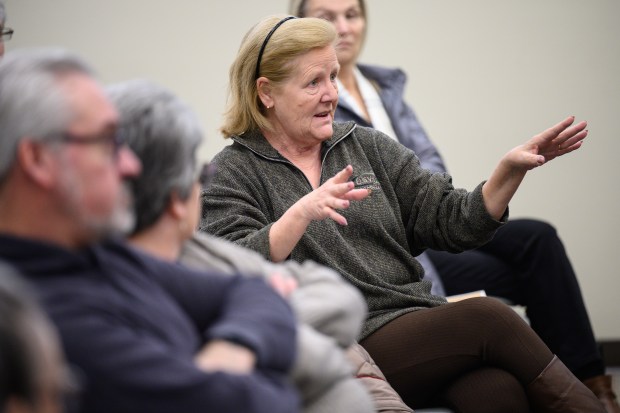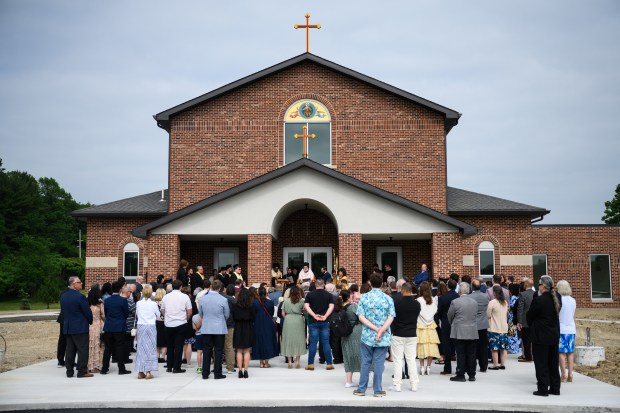Throughout the first half of the legislative session, State Rep. Chuck Moseley, D-Portage, said the theme has been consistent — from Gov. Mike Braun in his State of the State address to Republican legislators — Do more with less.
“That’s all we’re hearing down there, ‘You gotta learn how to do more with less.’ The definition of ‘You gotta learn how to do more with less’ is basically don’t look to the state for help and support back in your local communities. Your local leaders and your local communities are going to have to figure it out for themselves,” Moseley said.
What that means, Moseley said, is that local governments will receive less state funding and have to figure out how to fund roads, schools and health care.
“There’s some adjusting that’s going on,” said Sen. Rodney Pol Jr., D-Chesterton.
Property taxes, education and the Illinois secession bill were major concerns for local legislators and about two dozen people who gathered Saturday in Portage for the first of three town halls Pol held at the midway point of the 2025 legislative session. Moseley joined Pol at the first town hall.
Senate Bill 1 addresses property tax reform, which Braun campaigned on when he ran for governor.
Under current law, the homestead deduction is $48,000 or 60% of the assessed value of a home, whichever is less, Pol said. The initial bill provided for a homestead standard deduction amount of 60% of the homestead’s assessed value if the value is more than $125,000 or $48,000 plus 60% of the remaining assessed value if the homestead has an assessed value of $125,000 or less.
Pol and Moseley agree that the increase in property taxes have been hurting Hoosiers, especially those on a fixed income, Pol said.
But decreasing property taxes across the board would hurt local governments, Pol said, because those entities use property tax dollars to fund police, fire, schools, roads, park districts and other things.
“For us, we had to find a balance,” Pol said. “Our main focus has always been we need to provide property tax relief but we also don’t want to stifle the locals because ultimately somebody is going to have to pay for those costs. Understandably, it was going to put pressure on the locals.”
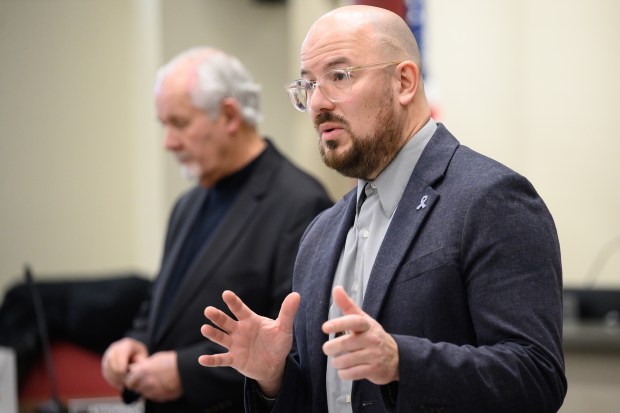
Senate Bill 1 changes the percentage cap used to determine the maximum levy growth quotient to 0% in 2026, 1% in 2027 and 2% in 2028, Pol said. It was also amended to offer relief to those 65 and older and the disabled and to establish a tax credit for first-time homebuyers.
It allows for local governments to utilize a levy referendum during even-year general elections.
Under the bill, county fiscal bodies, such as the Porter County Council, may establish a property tax payment deferral program, where up to $10,000 can be deferred and the deferment becomes a lien on the property. For the deferral program, Pol said, the bill outlines some parameters for it, including: the homeowner has to live in the home, has to have lived in it for at least five years and can’t be delinquent on property taxes, among others.
Pol said he likes the county deferment program because it allows local governments to establish a property tax relief program that meets the needs of their residents and community.
“We’ve basically seen the pendulum swing,” Pol said of Senate Bill 1 because its initial form didn’t take local government into account but it has been amended to consider the needs of local governments a little more.
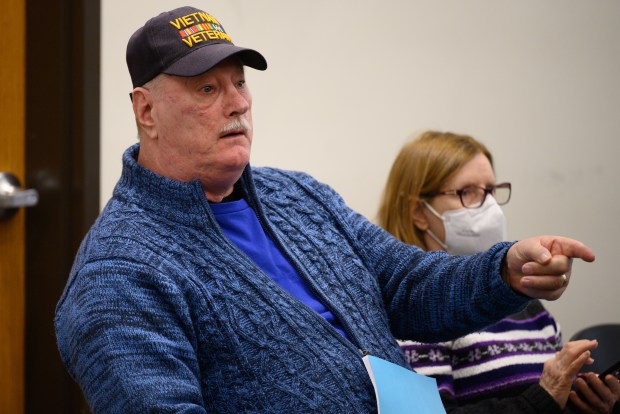
But, Pol said the legislature has heard from local officials that their budgets are tight and there aren’t many areas where they could cut funding.
Indiana implemented property tax caps about 15 years ago, Moseley said, which “was all fine and good” but the assessed values of homes weren’t capped at the time. In the past five years, assessed values have increased by around 50% in Lake County.
Moseley said he will work toward addressing assessed values when the House reviews Senate Bill 1.
But, Pol said the legislature has heard that Braun doesn’t like the amended Senate Bill 1, which means the bill will likely be amended further as it moves forward to the House. Legislators have heard that if Senate Bill 1 came to Braun’s desk in its current form, he would veto it and the legislature would have to return for a special session, Pol said.
Mary Ruiz, a Portage resident, said Indiana has always aimed to reward rich people with its tax policy, similar to Elon Musk and his “chain saw” at the federal level. But, Ruiz asked if the state has considered how its tax base will be affected if it potentially adds nearly three dozen counties from Illinois.
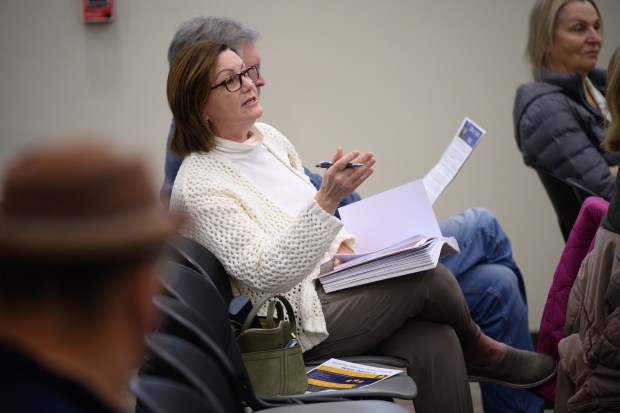
House Speaker Todd Huston, R-Fishers, drafted House Bill 1008, which would establish an Indiana-Illinois boundary adjustment commission to research the possibility of adjusting the boundaries between the two states. The commission would include five members appointed by the Indiana governor and five members appointed under Illinois law.
Huston drafted the bill after he learned that nearly three dozen Illinois counties have voted in recent years to leave the state, he said.
Moseley said the Indiana-Illinois boundary won’t shift because it would have to be approved by Illinois and Illinois Gov. JB Pritzker won’t go for it.
To change a state line, the U.S. Constitution dictates that the Indiana legislature, the Illinois legislature, and then Congress would have to approve the measure, said Paul Helmke, Indiana University Paul H. O’Neill School of Public and Environmental Affairs professor.
The counties being considered rely heavily on the state of Illinois, Moseley said, so if they were absorbed by Indiana they would become a fiscal burden on the state.
“I don’t understand why we would want to take on all the debt when you’re telling us that we now have to do more with less,” Moseley said. “At the end of the day, I don’t get it either. I don’t understand what they’re trying to do here.”
Martha Rae asked how much “the political theater” of discussing the Illinois-Indiana secession bill will cost the state.
“There’s a lot of waste there. If we’re supposed to do more with less, I think they need to look in the mirror,” Rae said.
Pol said many of his bills don’t get heard because Republicans control which bills are heard and tell him there wasn’t enough time within the legislative session to hear his bills. While that is frustrating, Pol said, it’s more frustrating when bills like the Illinois secession bill are allowed through.
“This is a stunt,” Pol said of House Bill 1008. “We’re wasting all this time talking about this.”
House Bill 1008 passed the House and will be heard by the Senate.
Senate Bill 2, authored by Sen. Ryan Mishler, R-Mishawaka, places restrictions on Medicaid. Membership in the Healthy Indiana Plan, which is funded through Medicaid, nearly doubled before COVID to post-COVID, Pol said, from 400,000 to 700,000.
Under SB2, the Healthy Indiana Plan can’t be advertised and the program is “arbitrarily” capped at 500,000, Pol said.
“We haven’t seen the data that demonstrates why it should be 500,000 people or how that is ultimately going to reduce costs. We know that every action has a reaction and our worry is that we’re going to end up paying for it,” Pol said.
The bill also establishes work requirements for the plan, Pol said, which includes working or volunteering at least 20 hours a week.
The initial bill proposed a 36-month cap for being on the program, but that language was removed from the bill, Pol said.
SB2 passed the Senate and will move to the House for consideration.
Under education, Pol said Senate Bill 146, authored by Sen. Linda Rogers, R-Granger, raises teacher base compensation from $40,000 to $45,000. It passed out of the Senate and will be considered by the House.
Pol said he’s glad the legislature has worked toward increasing teacher pay but that it’s not enough. Pol said his wife is a teacher so he knows firsthand that a portion of their paychecks go toward fostering their students’ education.
“This to me was a win, but it’s still not where we should be,” Pol said.
Pol said his bill Senate Bill 409, which prohibits employers from taking adverse action against an employee for attending their child’s case conference committee at school, passed out of the Senate.
Senate Bill 518, authored by Rogers, says that as of May 2025 funds from a school corporation referendum have to be shared with area charter schools.
Charter schools are funded through a state charter grant fund, Pol said. The bill would alter the charter grant fund calculation as the schools receive referendum dollars from school corporations, he said.
“This has a lot of people freaking out because this is going to hurt public schools in a serious way,” Pol said. “One of the things that we’ve consistently heard is that Gov. Braun wants to expand vouchers again to universal.”
About five years ago, Moseley said, $83 million disappeared from the voucher program, and to this day no one has been able to figure out where it went and who is responsible.
“Why, as your state representative, would I support a program that allows your tax dollars to disappear,” Moseley said.


